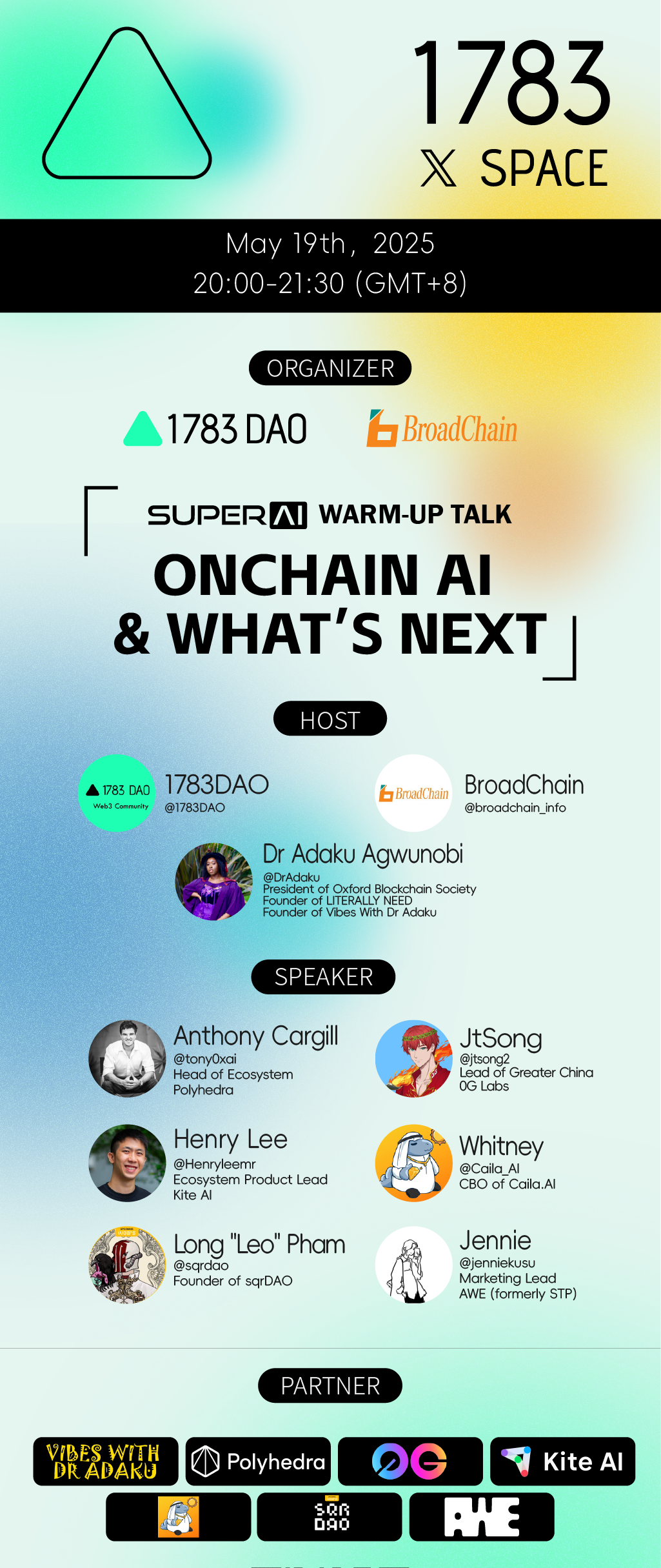
As the AI x Web3 convergence accelerates, "Onchain AI" is no longer a buzzword — it’s a battleground of infrastructure, ETHics, and experimentation.
To warm up the conversation ahead of SuperAI Week in Singapore, 1783DAO and Broadchain Finance hosted a cross-ecosystem Twitter Space to ask: What exactly is Onchain AI, where is it headed, and who's actually building?
Moderated by Dr. Adaku Agwunobi (Oxford Blockchain Society), the panel gathered builders from Polyhedra, 0G Labs, KITE AI, Caila.AI, sqrDAO, and AWE (formerly STP). From ZKML and decentralized compute to travel agents and AI-native DAOs, the conversation was a fast-paced tour of emerging trends and grounded challenges.

Jt Song, Greater China Lead at 0G Labs, working on modular infrastructure for AI data and compute.Henry Lee, Ecosystem Product Lead at KITE AI, building the trust layer for the agent economy.
Whitney, CBO of Caila.AI, leading efforts in travel-focused AI agents and DePIN integration.
Long “Leo” Pham, Founder of sqrDAO, exploring community-driven AI coordination in Southeast Asia.
Jennie, Marketing Lead at AWE (formerly STP), developing autonomous worlds and agent-to-agent collaboration.
The panel opened with a foundational question: what does it really mean to bring AI on-chain?
Henry Lee from KITE AI made a key distinction that framed much of the discussion: is Onchain AI about running models directly on-chain, or about verifying the outputs they produce?
In practice, it’s the latter — and that’s where the real opportunity lies. Fully on-chain models remain technically infeasible for most use cases, but ensuring the provenance and integrity of AI-generated actions is both possible and essential. As AI agents begin to operate more autonomously, this “trust layer” becomes foundational to keeping systems accountable.
Anthony (Polyhedra) emphasized the role of zero-knowledge machine learning (ZKML): "It’s like showing the chef behind the algorithm without seeing the entire kitchen." For him, verifiable AI is about transparency in critical systems like finance or healthcare.
He likened traditional AI to a restaurant that won’t tell you who the chef is or show you the kitchen — ZKML, in contrast, puts the chef in a glass kitchen. You can’t see everything, but you can verify who made the decisions and that they’re trustworthy.
Whitney (Caila.AI) made it concrete: weather data is often wrong, and inaccurate forecasts cost real money in tourism and agriculture. On-chain validation ensures quality and eliminates fake or manipulated data.
JT (0G Labs) added that most current "AI + crypto" solutions still rely on Web2 infrastructure. Onchain AI requires rethinking the full stack: decentralized storage, compute, and in-AI assets.
sqrDAO is testing AI across trading and community engagement. One agent analyzes token trends; another mimics the founder’s tone in Telegram chats to keep engagement authentic.
Long "Leo" Pham explained: “We trained the agent on how I speak in Telegram. Now it auto-posts in my tone — like a digital twin that keeps the vibe going.
Jennie (AWE) mentioned AWE recently launched “AI Shark Tank” — a virtual showcase where AI agents simulate pitching projects and providing peer feedback, modeled after the famous startup TV show. It runs entirely within their Autonomous World framework on Base, pushing the boundaries of agent-to-agent collaboration.
Long "Leo" Pham (sqrDAO) noted: "Without clean, high-integrity data, your AI agent just yaps like every other one on Crypto Twitter." Data first, agents SECond.
Henry highlighted the disparity in capital: "In Q3 2024, Web2 AI raised ~$100B. Crypto AI? ~$200M."
JT Song noted that even leading AI projects still rely on Web2 models and infrastructure. Without new decentralized standards, we're far from truly being on-chain.
Anthony stressed education: "I still meet AI founders who don’t know what ZK is." Misinformation, bias, hallucination — these risks escalate when agents act autonomously without traceable logic.
He warned that without understanding verifiable architecture, teams risk building opaque systems that undermine the very trust blockchains are meant to guarantee.
Panelists shared some upcoming events and activations:
sqrDAO: hosting a contributor summit on AI in Vietnam (June 3)
Polyhedra, KITE AI, 0G Labs: confirmed presence in Singapore during SuperAI
Caila.AI: now integrated with Onchain Opera
1783DAO: exclusive SuperAI Side Event incoming (follow for updates)
"Onchain AI" is not one product, or protocol, or slogan. It's a design philosophy: how do we build systems that learn, adapt, and act—with verifiable trust?
The builders in this Space weren't chasing hype — they were grappling with hard questions around ethical AI, model provenance, and what on-chain verification truly entails.
As Anthony from Polyhedra put it: "We’re not just building better AI. We’re building accountable systems."
That’s why Onchain AI matters—not because it’s trendy, but because it’s necessary.
Space Link:https://x.com/i/spaces/1kvKpyQXWnwGE
 120
120
 103
103
 101
101
 91
91
 89
89